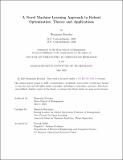A Novel Machine Learning Approach to Robust Optimization: Theory and Applications
Author(s)
Boucher, Benjamin
DownloadThesis PDF (1.425Mb)
Advisor
Bertsimas, Dimitris
Terms of use
Metadata
Show full item recordAbstract
The increasing availability of data offers modelers unprecedented opportunities to improve decision-making. In particular, we can leverage machine learning based approaches to estimate parameters of optimization models, enabling more informed decisions. However, these models often inherit uncertainty from the data they are trained on, leading to unreliable decisions when deployed at face value. This body of work develops robust optimization frameworks that take into account these uncertainties, by bridging theory and practice to mitigate decision-making risk. This thesis is organized into three chapters.
In Chapter 2, we present a robust scheduling approach tailored to hospital operations, where post-surgery recovery times are uncertain and right-skewed. Our method captures the underlying distribution of patients' length of stay by taking into account their surgery type, and without necessitating detailed patient-level features. Applied to the Bone and Joint Institute of Hartford Hospital’s elective surgery scheduling problem, our approach reduces the monthly peak census---freeing up valuable hospital beds and improving system flexibility in the face of emergencies.
In Chapter 3, we introduce a general methodology for constructing uncertainty sets informed by the loss functions of machine learning models. These sets are designed to protect against prediction errors in estimated optimization parameters. Extending guarantees from the robust optimization literature, we derive strong guarantees on the probability of violation. Synthetic computational experiments show that our method requires uncertainty sets with radii up to one order of magnitude smaller than those of other approaches.
Lastly, in Chapter 4, we apply robust optimization to the domain of recommendation systems, where user and item interaction data are often noisy or adversarially perturbed. We can improve model robustness by modifying the training loss to defend against worst-case inaccuracies in user preference data. Because our approach adds only a single trainable parameter to the optimization model, its runtime impact is negligible. To evaluate the effectiveness of our method, we apply our modified loss function to a suite of recommendation systems from the literature and show consistent improvements in the performance of these methods on synthetic and benchmark datasets, as well as diminished ranking sensitivity.
Date issued
2025-05Department
Massachusetts Institute of Technology. Operations Research Center; Sloan School of ManagementPublisher
Massachusetts Institute of Technology